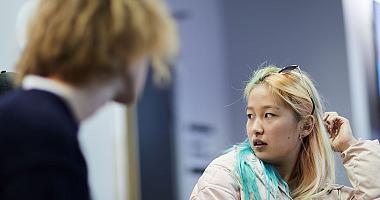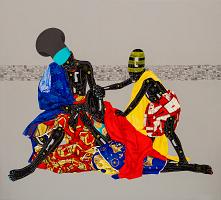MA Media and Communications
Content navigation menu
Why study MA Media and Communications at Goldsmiths
Join a pioneering MA Media and Communications programme in a world-leading school. Founded in 1993, this Master's programme reflects the research-led interdisciplinary approach we take to media and communications that has made us leaders in the field. We value the creative and the critical and their interrelationships, to explore and interrogate how the complex, mediated worlds we live in work.
- You’ll study in one of the top Media, Communications and Cultural Studies schools globally. We are ranked second in the UK for 'world-leading or internationally excellent' research (Research Excellence Framework, 2021) and 16th in the world (third in the UK) in the 2024 QS World Rankings by Subject.
- The programme aims to provide you with ways to understand, analyse and intervene within the complex, mediated worlds we live in, from how the digital age has transformed our communicative experiences to how the mediated worlds impact the rituals of our daily lives. Read more about the subject matters you will explore.
- Our teaching is theory-driven, but you will also have the opportunity to undertake a practice option in a range of areas, including journalism, campaigns and design, and the Screen School.
- You’ll complete a dissertation, where you will research a subject that ignites your interest. From creativity and AI, and post-pandemic digital practices to queerness in gaming, these are just some of the topics that past students have researched, but your dissertation topic is entirely up to you.
- We encourage you to look at issues holistically. Alongside lectures and seminars, we run workshops, screenings and cultural trips to encourage you to explore the role of the media in our lives as widely as possible – from the individual and organisational level to corporations, the state, and the market across both the public and private sectors.
- Every year we change the content you study to relate to existing issues, so we’ll always be working on what’s current. We take a collaborative approach, bringing in many different intellectual ideas and calling upon a whole range of ways of thinking which have been traditionally compartmentalised.
- Together, we will investigate modern-day issues to establish how the media are implicated in different aspects of life and the way the world functions.
Contact
If you have specific questions about the degree, contact Professor Lisa Blackman.
Length
1 year full-time or 2 years part-time
Entry requirements
You should have (or expect to be awarded) an undergraduate degree of at least 2:2 standard in a relevant/related subject. You might also be considered if you have relevant experience and can show that you have the ability to work at postgraduate level.
Fees
Home - full-time: £12800
Home - part-time: £6400
International - full-time: £23000
School
You'll explore
Investigating the mediated worlds we live in
The digital age has transformed our communicative experiences from how we make sense of issues, our experience of a viral pandemic, how we connect with friends (and even what counts as a friend across social media platforms), how we protest, lobby, and respond to humanitarian disasters, how we develop particular tastes, our attachments to ideas and beliefs, and even what counts as truth.
Our mediated worlds impact the rhythms and rituals of our daily lives changing the way we think about and create things, even the way we conceive of ourselves. The news is available instantaneously, 24 hours a day. Social media has expanded exponentially in reach, transforming personal relationships, politics and business. At the click of a button we can share our experiences and build solidarities across the world.
The media are no longer just delivered to us but also things that we make and distribute ourselves. Mobile technology ensures we are tuned in and connected at all times.
The questions we ask
Challenging assumptions is at the core of this course. We want rich, complex answers formed through theoretical and empirical work. To get to these we ask demanding questions:
How is storytelling changing as we explore the affordances of digital platforms and infrastructures? What happens to personal relationships in digital media environments? How do people affected by disasters use social media and other media to recover? How does the media influence our lives as citizens and our own (as well as others) political decisions? What do media democracies look like in the age of post-truth? Does social media enable new forms of protest and political action?
Our engagements with media are deeply emotional, whilst at the same time they are practices through which we experience the interrelationship of politics, economic systems, histories, cultures, technologies, aesthetics, and identities. One of our primary concerns on this MA programme is to work out what role media plays in the ways we live together – to provide a critical appraisal of our mediated existences. What does it mean to live in a digital age?
What you'll study
You will take the following two core modules:
| Module title | Credits |
|---|---|
| Introduction to Media and Communications Theory | 30 credits |
| Dissertation | 60 credits |
Introduction to Media and Communications Theory
This module will introduce you to key theories and enable you to develop and explore interdisciplinary perspectives on the study of contemporary processes of mediation.
The content of the module changes in response to current debates but has at its core a concern with the role media plays in fostering and challenging inequalities. Does the development and expansion of digital media lead to new forms of media and new ways of experiencing and intervening within our worlds?
Questions of how to engage with cultures of inequality have been at the heart of media and cultural studies, and this will be reflected throughout the module, where we aim to take an intersectional approach and are committed to developing an anti-racist curriculum.
You will explore new ways of understanding media whilst developing your knowledge of key foundational debates that are still relevant now. The theories and skills you learn will form the basis for the more specific analytical skills and knowledge you will develop in your options and your dissertation.
Dissertation
You will complete a dissertation based on independent research, which is supported by a module in research skills training.
Your dissertation can explore any subject of your choice.
Topics recently explored by students include: creativity and AI, self-media work and the creative industries, photomaking and photosharing practices, hashtag activism and campaigns for social justice, digital practices post-pandemic, disinformation and post-truth, queerness in gaming, Chinese-American creators on YouTube, health communication, personalised advertising, K-Pop and mental health, podcasting and digital storytelling.
Assessment
The MA is assessed primarily through coursework essays and written projects. Practical modules may require audiovisual elements to be submitted. It will also include a dissertation of approximately 12,000 words.
Research in the School of Media, Communications and Cultural Studies
In addition to the required core and option modules, a strong emphasis is placed on student participation in the research culture of the school and College.
Members of the school have published many books with high-impact international presses, and articles in leading international journals on a diverse range of topics including:
- Affect and emotion
- Artificial intelligence
- Bioethics
- The body and experience
- Branding
- Broadcasting
- Media democracies
- Film history, screen studies
- Technocolonialism
- Critical disinformation studies
- The future of journalism
- Media geographies
- The mediation of power
- Mediated feminisms
- Postcolonial and decolonial politics
- Sound and video cultures
- Media arts and XR technologies
- Critical media psychology
- Body studies
- Media and migration
- Gender and sexuality
- Cultures of creativity and digital labour
- Media histories
- Politics of data and AI
- Geo/politics
- Economics and history of news media around the world
- Media and citizenship
Research Units
Our current research centres and units are:
- Digital Culture Unit
- Centre for Feminist Research
- Goldsmiths Leverhulme Media Research Centre
- Centre for the Study of Global Media and Democracy
- Topology Research Unit
The Future of Media
Our book, The Future of Media, (Goldsmiths press, 2022) will give you a broad introduction to some of the research which has shaped the school.
Description
How do we combat post-truth in the news? Are social media influencers the journalists of today? What is it like to live in a smart city? Does AI really change "everything"? The Future of Media investigates the future of media industries and technologies (journalism, TV, film, photography, radio, publishing, social media), while exploring how media shape our future—on a political, economic, cultural and individual level. Issues of diversity, media reform, labour, activism and art take the discussion into a wider social context. Through this, the book celebrates the importance and vitality of media in the modern world. The Future of Media is also an experiment in collaborative modes of thinking and working. Co-authored by theorists and practitioners from one of the world's most established media schools, it offers a radical, creative and critical take on media industries—and on world affairs.
Read an online, open-access copy of The Future of Media, (Goldsmiths press, 2022).
Entry requirements
You should have (or expect to be awarded) an undergraduate degree of at least second class standard in a relevant/related subject.
You might also be considered if you aren’t a graduate or your degree is in an unrelated field, but have relevant experience and can show that you have the ability to work at postgraduate level.
International qualifications
We accept a wide range of international qualifications. Find out more about the qualifications we accept from around the world.
If English isn’t your first language, you will need an IELTS score (or equivalent English language qualification) of 6.5 with a 6.5 in writing and no element lower than 6.0 to study this programme.
If you need assistance with your English language, we offer a range of courses that can help prepare you for postgraduate-level study.
How to apply
Apply directly to Goldsmiths using our online application system
You apply directly to Goldsmiths using our online application system.
Before submitting your application you’ll need to have:
- Details of your academic qualifications
- The email address of your referee who we can request a reference from, or alternatively a copy of your academic reference
- Copies of your educational transcripts or certificates
- A personal statement – this can either be uploaded as a Word Document or PDF, or completed online. Please see our guidance on writing a postgraduate statement
You'll be able to save your progress at any point and return to your application by logging in using your username/email and password.
When to apply
We accept applications from October for students wanting to start the following September.
We encourage you to complete your application as early as possible, even if you haven't finished your current programme of study. It's very common to be offered a place that is conditional on you achieving a particular qualification.
Late applications will only be considered if there are spaces available.
If you're applying for funding, you may be subject to an earlier application deadline.
Selection process
Admission to many programmes is by interview, unless you live outside the UK. Occasionally, we'll make candidates an offer of a place on the basis of their application and qualifications alone.
Find out more about applying.
Fees and funding
Annual tuition fees
These are the PG fees for students starting their programme in the 2025/2026 academic year.
- Home - full-time: £12800
- Home - part-time: £6400
- International - full-time: £23000
If your fees are not listed here, please check our postgraduate fees guidance or contact the Fees Office, who can also advise you about how to pay your fees.
It’s not currently possible for international students to study part-time under a student visa. If you think you might be eligible to study part-time while being on another visa type, please contact our Admissions Team for more information.
If you are looking to pay your fees please see our guide to making a payment.
Funding opportunities
Aziz Foundation Scholarship
Up to nine full fee waiver scholarships are available. The scholarship is open to British Muslims who are Masters offer holders with specific career aspirations, including a career in media or journalism.
Find out more about the Aziz Foundation Scholarship.
Explore the Goldsmiths scholarships finder to find out what funding you may be eligible for.
Paying your fees
Find out about paying your tuition fees.
If you are a UK student you may be eligible for a postgraduate loan.
Meanwhile our Careers Service can also offer advice on finding work during your studies.
Additional costs
In addition to your tuition fees, you'll be responsible for any additional costs associated with your course, such as buying stationery and paying for photocopying. You can find out more about what you need to budget for on our study costs page.
There may also be specific additional costs associated with your programme. This can include things like paying for field trips or specialist materials for your assignments. Please check the programme specification for more information.
Careers
The School of Media, Communications and Cultural Studies has a strong record of employment prospects for its graduates and has established strong links with the creative industries in London and beyond.
We have a significant number of international students on the MA Media and Communications, some of whom come to the programme by arrangement with their employer in their home countries, and return to their jobs on completion. A number are seeking professional development and a career change, or are updating their skills and expertise in the fields of media and communications in order to enhance their role and to contribute to the innovation and development of the media, creative and cultural industries in their home countries.
A number of students, depending on visa arrangements, elect to stay in London and seek work in the media industries.
Some students set up their own businesses in the fields of media and communications and have helped to innovate the field and the future of media. A small group from each annual intake go on to do further academic research, such as a PhD.
Many of our graduates also move into research to apply the rigour of theoretical study to problems they encounter in their everyday lives.
Graduates from this degree go into:
- Advertising
- Marketing and public relations
- Broadcasting and print media
- Social media
- NGOs and intergovernmental organisations
- The arts and heritage sector
- Digital media and communications heads/managers across a variety of sectors





